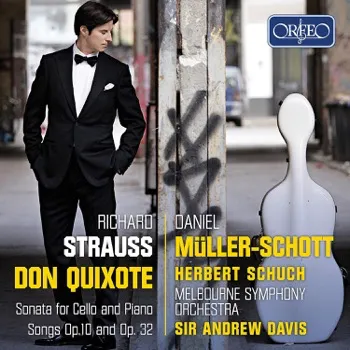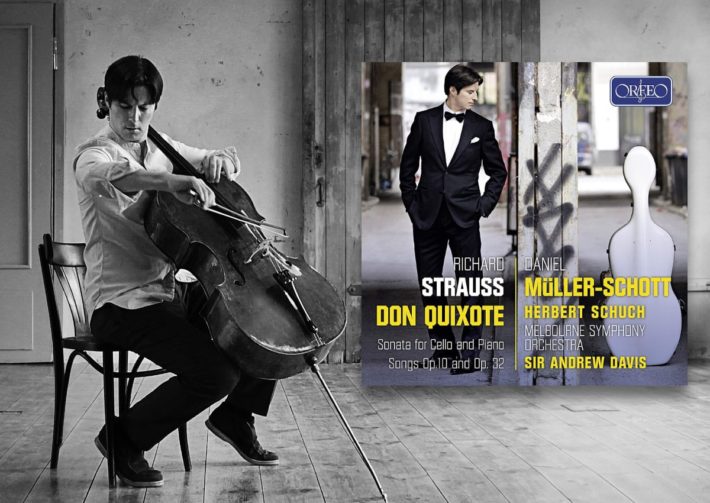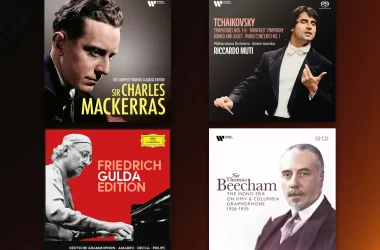Müller-Schott adds to his growing list of accomplished recordings with this exciting release of two major cello works by Richard Strauss. While the Cello Sonata arguably stands on the periphery of the standard cello repertoire, Don Quixote is one of Strauss’s most often performed works, with roughly 75 recordings currently available. It says a great deal about Müller-Scott that he need not fear comparison with the performances by some of the greatest cellists of the last century, such as Fournier, Rostropovich and Tortelier.

The Cello Sonata is first on the program. written in 1881 while Strauss was still in grammar school (and thoroughly revised in 1882/83 to become the version we hear on this recording), the writing is more conservative than what we expect from the composer of Don Juan and Salome. Strauss’s father was very much against the “new music school” exemplified by Wagner and Liszt, pushing his son to instead follow the ideals of the “old music school” embodied by Brahms and Mendelssohn (a wish his son ultimately rejected). Nevertheless, there are several moments in the sonata where the mature Strauss is clearly heard. In the liner notes, Müller-Scott describes the work as “exuberant”, and say that he is deeply moved by the “(…) forward-pressing ardency in the outer movements and the deep melancholy in the slow movement”. Indeed, it is these very qualities that he and pianist Herbert Schuch capture marvelously, in a recording with a perfectly natural balance between piano and cello. The Sonata is followed by two song transcriptions in which Müller-Schott’s gorgeous tone and seamless legato would be the envy of many singers.
Most likely, most listeners will be primarily interested in this recording for the performance of Don Quixote, and they will not be disappointed. Sir Andrew Davis and the Melbourne Symphony bring a passion and transparency to Strauss’s often dense contrapuntal textures right from the start, while the live recording (with a silent audience) brings out extra frisson from Davis and his players that is sometimes absent from their studio recordings (his latest Berlioz recording reviewed here). Throughout the 42-minute performance, Davis and the orchestra prove to be exceptionally sensitive accompanists, allowing Müller-Schott and violist Christopher Moore great flexibility and freedom to banter with and against one another.
The story’s physical and psychological elements are vividly conveyed in this performance. Particularly impressive is the second variation (track 10), where Don Quixote charges into a field to attack his adversaries, who turn out to be a flock of sheep. The orchestra’s winds do a fabulous job of mimicking the flock, while Davis takes great care to highlight the dissonances in the writing, thereby capturing Don Quixote’s confused state of mind. Müller-Schott is quite affecting in the fifth variation (13), as Don Quixote fantasies about heroic deeds and wooing the lady Dulcinea. Soloists, orchestra and conductor come together to make the Epilogue, as Don Quixote passes away peacefully, a true emotional catharsis.
There are certainly times when one might crave the sumptuous sound and larger-than-life characterization of the classic recording by Rostropovich, Karajan and the Berlin Philharmonic. But that ‘Larger than life” characterization can sometimes seem like the story is a struggle between god-like creatures. What makes this new recording particularly special is how fully they capture the humanness of Cervantes’s story. Don Quixote is a touching examination of human suffering, the desire for love and the need for healing, and that is the essence of this new performance.
Strauss – Don Quixote, Cello Sonata, two songs
Daniel Müller-Schott – Cello
Herbert Schuch – Piano
Melbourne Symphony Orchestra
Sir Andrew Davis – Conductor
Orfeo CD C 968 191




















